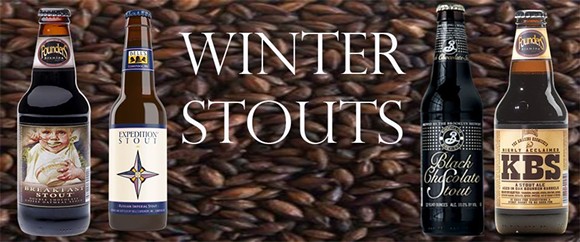CRAFT BEER, like the weather, has its seasons and right now is prime stout season. Big, roasty and rich’ stouts go well with colder weather.
Stouts are available year round of course but it is late in the year that many breweries release their best stouts, often as limited releases. This trend continues into the early part of the year, which is great for those of us in the South whose winter doesn’t really kick in until mid-January.
This is a great time to pick up a few versions to hold onto until those colder nights do come around though a good stout is worth drinking any day of the year.
In fact, stouts were for a long time the drink of choice for drinking during the day every day. English workers in the late 19th and early 20th centuries would have breaks in their work days, the equivalent of our lunch break.
These breaks were called sessions. Lower ABV beers that kept poor workers full but sober enough to work were called session beers.
Stouts, being heavier than your average beer, had the benefit of being even more filling making them a preferred session beer.
That said, stouts were originally not the dark beers we see on the contemporary beer shelf. There is a reference in a 1677 manuscript that tells us the term stout simply referred to the strongest, stoutest beer in a brewery’s line up.
Porter was the term most often used to market dark beers. The popularity of porters led to the use of different terms for the various strengths of those porters. Stout porters were the strongest variation.
Eventually the name stout porter was shortened to stout and came to represent the dark beers on our shelves now.
There are several versions of stouts. Milk stouts are brewed with milk lactose to give them a creamy mouth feel and a sweetness of flavor. Dry stouts are the counter to the milk stouts, lacking the lactose sweetness.
Oyster stouts are stouts brewed with oysters. Oyster stouts came about in an attempt to add a little protein and flavor to the poorer Englishman’s diet. It may sound like an odd addition but the briny flavor really does compliment the roasty flavors of a good stout.
All of those styles are great and worth keeping in the refrigerator, but I want to talk about two styles that are the best fit for this time of year, Russian imperial stouts and oatmeal stouts. Russian Imperials Stouts earned their name because of the English brewed beers popularity in, you guessed it, Russia.
The story is that they were brewed with a high ABV so that they didn’t freeze on the voyage from England to Russia. A versatile beer, imperials stouts readily take a lot of different flavors. They are rich on their own but you will see them with added chocolate and sometimes spices.
Oats can be a standard addition in many beers but they work really well in stouts. The proteins and gums in oatmeal increase the thickness and add smoothness to stouts without altering the flavor.
Russian imperial stouts brewed with some oatmeal have the add sweetness on top of the already rich flavors of the imperial stout. Add in a little coffee and sometimes chocolate to the brewing process and you get the apply titled breakfast stout.
This is the best of all the worlds. The thickness coats the tongue, the sweet and coffee meld well together on top of a velvety toasted oat.
It’s the breakfast stout that shines this time of year. A few of the best are listed here but I’ll throw in a few other variants to keep an eye out for.
Breakfast Stout, Founders Brewing: One of the best of the style. The coffee and chocolate are the dominant flavors in Founders version. They use bitter chocolate so the beer isn’t too sweet and two types of coffee making this the coffee loving beer drinkers friend.
KBS, Founders Brewing: Take Founders Breakfast stout and age it on bourbon barrels and you get Kentucky Breakfast Stout (KBS), one of the great world class beers available. KBS is available here in town if you know who to ask. It may be a harder to find than your average beer but it’s not impossible by any stretch of the imagination. It’s certainly worth the trouble of hunting down.
Black Chocolate Stout, Brooklyn Brewing: Despite the name Brooklyn Brewery’s Black Chocolate Stout does not contain chocolate though those flavors are strong in this beer. All that chocolate comes from a mixture of roasted malts. This year marks the 18th year of the production of this 10% Russian imperial stout.
Expedition Stout, Bells Brewing: Bell’s excels at brewing stouts. Expedition like Black Chocolate has a rich chocolaty taste and aroma that is wholly derived from roasted malts. Expedition is also the base, along with Double Cream Stout for Bell’s Black Note Stout, their version of a bourbon barrel stout that will be released in the coming months.


